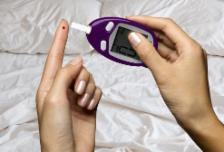 Can a Supplement
Really Control Blood Sugar?
Can a Supplement
Really Control Blood Sugar?
One
of the hottest selling supplements today is chromium picolinate, which its
advocates claim can control both diabetes and weight. Even the (*) U.S.
Food Drug Administration (FDA) in 2005 gave manufacturers permission to
include a qualified statement to the effect that their product could possibly
decrease resistance to insulin and perhaps help keep type 2 diabetes in
check.
How
Does the Body Use Chromium and Picolinate?
The
human body requires miniscule amounts of (*) chromium, which
has been found to aid insulin by effectively moving sugar from the bloodstream
into the cells where it can boost energy. From the late 1950s it was
often prescribed only to persons with documented chromium deficiencies.
Picolinate aids the absorption of chromium.
The
generally accepted daily allowance of chromium is 30 to 35 micrograms for men
and 20 to 25 micrograms for women. While the majority of the population
tends to take in less than this, chromium deficiency is not seen as a major
health issue. The mineral is present in foods such as cheese, bread made
from whole grains and cereal. However, low levels of chromium may lead to
higher bad (LDL) cholesterol, an increase in triglycerides, as well as
interfering with the body’s production of insulin.
Are There Any Studies to Support Claims?
Chromium picolinate is available at most health food stores, and
some supplement manufacturers combine it with other ingredients. They often claim that their product also
controls weight and reduces body fat. A look at a popular, though
over-priced, brand name along with what the experts say about how the
ingredients work will shed some light on whether these claims are exaggerated.
Glucosulin,
for example, contains 50 micrograms in every capsule and there are 90 capsules
in each bottle, which is sold for $50 (31.1 pounds or 34.5 euros). Each
capsule also contains 928 micrograms of these combined ingredients: konjac root, sodium alginate, xanthum gum,
mulberry extract, and gymnema slyvestre extract. The makers of Glucosulin
suggest a daily dosage of four capsules, or 200 micrograms be taken, which is
in agreement with practitioners at the Medical Center for the (*) University
of Maryland. According to (*) Joe
Cannon, who reviewed Glucosulin, all of the ingredients except sodium
alginate may lower blood sugar.
Mulberry Extract: (*) Dr. Ray Sahelian, who writes convincingly about this ingredient, says that mulberry extract has antioxidants and may also lower blood sugar. Additionally, he cites a study that showed mulberry extract interfered with the absorption of carbohydrates. It has a laxative effect. Studies have not yet determined a recommended dosage or how much of mulberry extract would be harmful.
Xanthum
Gum: According to (*) WebMD, this
food additive is used to lower both cholesterol and blood sugar in people with
diabetes. It can also be used to thicken up the smoothies you make with
raw food. It is safe in quantities of 15 grams per day. Above that level
it may cause some digestive discomfort.
Gymnema Slyvestre: An article on the website for (*) Wellness Resources cites two animal studies that found gymnema slyvestre lowered blood sugar levels by encouraging the pancreas to increase insulin production.
Are There Risks?
Glucosulin is a dietary supplement whose very name aligns it with
products for diabetes. If you have type 2 diabetes, it is best to talk to
your doctor before taking supplements of any kind, but especially ones that are
said to affect blood sugar levels. There may be a risk that it interferes
with your (*) prescribed
medications. If all those extra ingredients concern you, but you are
still interested in the blood sugar benefits of plain chromium picolinate, it
is possible to buy supplements for around $10 (6.2 pounds or 7 euros).
After
looking for that quick answer to blood sugar control, the safest, least
expensive answer comes back to improving nutrition and getting adequate
exercise. Supplements have their place, but it you really want to know
what you’re getting, use a healthy smoothie recipe to control diabetes or
reduce your blood sugar level.
- US FOOD DRUG ADMINISTRATION (FDA) reference on http://www.nutrasolutions.com/articles/nutritionals-at-the-tipping-point
- Chromium on Health Library: http://www.umm.edu/altmed/articles/chromium-000294.htm
- University of Maryland - Reference on http://www.umm.edu/altmed/articles/chromium-000294.htm
- Joe Cannon reference on http://supplement-geek.com/glucosulin-weight-loss-supplement-review/
- Dr Ray Sahelihan, M.D. reference http://www.raysahelian.com/mulberry.html
- WebMD reference - http://www.webmd.com/vitamins-supplements/ingredientmono-340-XANTHAN%20GUM.aspx?activeIngredientId=340&activeIngredientName=XANTHAN%20GUM
- Wellness Resources: http://www.wellnessresources.com/studies/how_gymnema_sylvestre_helps_blood_sugar/
- Prescribed medications - Supplements: http://www.nutritional-supplement-educational-centre.com/health-supplements.html
(C) 2014 OmniBlender.COM LLC